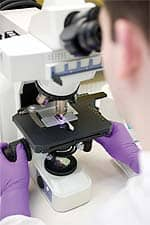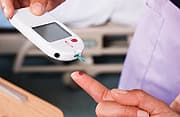Life Extension Magazine®
| An article published in the American Journal of Clinical Nutrition reports the finding of German researchers of an association between reduced vitamin K2 intake and an increased risk of dying from cancer.* The researchers analyzed data from 24,340 participants in the EPIC-Heidelberg study who were aged 35 to 64 upon enrollment between 1994 and 1998. Participants were followed through 2008. Over the follow up period, there were 1,755 cases of cancer, including 458 fatalities. While those whose intake of vitamin K2 was among the top 25% of participants had a 14% reduction in cancer incidence compared with those whose intake was among the lowest fourth, the group with the highest intake experienced a 28% lower risk of dying of the disease. The reduction occurred mainly in men. “This study showed inverse associations between the dietary intake of menaquinones and both overall cancer incidence and mortality,” the authors conclude. Editor’s note: The authors explain the difference in vitamin K2’s effects on men and women by the fact that the men in the study had cancer sites (prostate, lung) that were likelier to be influenced by vitamin K2. —Dayna Dye | |
| Reference | |
| * Am J Clin Nutr. 2010 Mar 24. | |
Intentional Weight Loss Helps, Not Harms, Seniors | |
The outcome of a study appearing in the Journal of Gerontology: Medical Sciences contradicts concerns raised by previous studies that deliberate weight loss among older individuals could increase the risk of death.* Researchers at Wake Forest University Baptist Medical Center analyzed data from 318 arthritic men and women over the age of 60 who participated in a randomized trial that evaluated the effects of dieting and/or exercise on physical function. Those assigned to a weight loss diet lost an average of 10.5 pounds over 18.5 months. Within 8 years after the trial’s conclusion, 15 deaths occurred among those assigned to weight loss diet interventions, compared with 30 in the remainder of the participants. “This study puts to rest a lot of unfounded concerns about how to address the epidemic of obesity among our older adults,” coauthor Stephen B. Kritchevsky, PhD concluded. Editor’s note: The current findings are in agreement with numerous animal studies that have associated increased life span with calorie restriction. —Dayna Dye | |
| Reference | |
| * J Gerontol Med Sci. 2010 Jan 15. | |
Brisk Walking Reduces Stroke Risk | |
According to a WebMD Health News article, women who walk two or more hours per week or who walk at a brisk pace can significantly reduce their risk of suffering a stroke.* Based on a study of the exercising habits of 39,315 female health professionals whose average age was 54, the findings showed that women who walked at a pace of 3 miles per hour or faster had a 37% lower risk of suffering any type of stroke. Women who walked two or more hours a week had a 30% reduced risk of any type of stroke. Jacob R. Sattelmair, MSc, of the Harvard School of Public Health was interviewed for the feature and concluded that “physical activity, including regular walking, is an important modifiable behavior for stroke prevention. Physical activity is essential to promoting cardiovascular health and reducing risk of cardiovascular disease, and walking is one way of achieving physical activity.” —Jon Finkel | |
| Reference | |
| * Available at: www.webmd.com/stroke/news/20100406/brisk-walking-reduces-stroke-risk. Accessed April, 19 2010. | |
Increased Omega-3 Intake May Improve Kidney Health for Diabetics | |
A research team headed by Dr. Amanda Adler from the MRC Epidemiology Unit at the Institute of Metabolic Science in Cambridge (UK), published findings in Diabetes Care stating that kidney function was improved in type-1 diabetics with the highest average intake of eicosapentaenoic acid (EPA) and docosahexaenoic acid (DHA), compared with people with the lowest intakes of the fatty acids.* They culled their results from data made available to them in the Diabetes Control and Complications Trial, which involved 1,436 participants who were between the ages of 13 and 39. The researchers measured the excretion of the protein albumin in urine. People who have kidney problems often experience a leakage of the protein albumin from the kidney into the urine. According to the study, people with a higher average intake of omega-3s had albumin excretion levels 22.7 mg per 24 hours lower than people with the lowest average intakes of omega-3s. —Jon Finkel | |
| Reference | |
| * Available at: http://care.diabetesjournals.org/content/early/2010/03/24/dc09-2245.abstract. Accessed April 20, 2010. | |
Green Tea May Strengthen Teeth | |
A new team of researchers from Japan suspect that antimicrobial molecules contained within green tea helps preserve teeth, as long as you don’t add sugar.* An article posted to discoverynews.com describes the findings, noting that catechins, found heavily in green tea, may be the protecting component. Yasushi Koyama, the lead researcher on the project from the Tohuku University Graduate School of Medicine, and his colleagues examined more than 25,000 Japanese men and women between the ages of 40 and 64. They discovered that men who consumed at least one cup of tea a day were 19% less likely to have fewer than 20 teeth than those who did not drink green tea. Women had 13% lower odds. The researchers concluded that catechins, which have been shown to kill mouth bacteria associated with tooth decay and gum disease, most likely give green tea its dental benefits. Editor’s note: The authors remark that an association with northern latitudes has also been observed for multiple sclerosis, Crohn’s disease, and other autoimmune diseases. —Jon Finkel | |
| Reference | |
| * Available at: http://news.discovery.com/human/green-tea-teeth-dental.html. Accessed April 20, 2010. |









